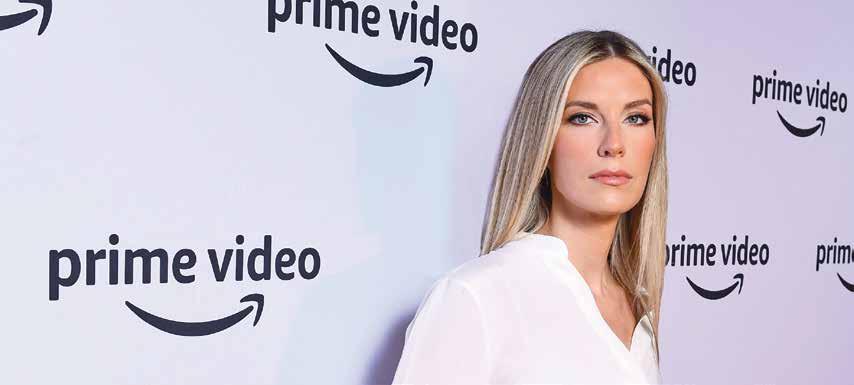
4 minute read
A PRINCIPAL PLAYER FOR PRIME VIDEO
By Christopher DeWolf
If the head of Amazon’s Prime Video for Canada, Australia and New Zealand can pinpoint a moment that sparked her interest in the legal issues that surround the entertainment industry, it may have been chats she had with her father in the early 2000s.
“We had a lot of discussions at home about MP3s and Napster and the implications of that,” says Magda Grace, BCL/JD’11. “At the time people were getting $10,000 charges from various music organizations for illegally downloading things.”
“It had a big impact on young people like me, who didn’t have a lot of money and were just looking for easier ways to consume media.”
These days, Grace herself plays an important role in the Canadian media space.
She runs a branch of the world’s second-largest streaming service, which has more than 200 million subscribers. She oversees content like Three Pines, a TV adaptation of Quebec author Louise Penny’s best-selling Inspector Gamache mysteries, and LOL: Qui rira le dernier?, a comedy reality show hosted by Patrick Huard.
A Dawson College graduate, Grace came to study law at McGill after completing a pre-law undergraduate program at the University of Toronto. She worked as a research assistant for law professor David Lametti, BCL’89, LLB’89, former attorney general and minister of justice of Canada, helping him with a paper about the ownership of intellectual property (IP) in the cloud. And she took every course she could find that dealt with the issues that increasingly intrigued her.
“The courses that really resonated with me were in digital rights and entertainment law,” says Grace.
“It was in those courses that I really started to build an understanding that I could turn this from a passion into a career.”
Following her studies at McGill, Grace earned a master’s degree in IP and entertainment law at UCLA. Then she plunged straight into Hollywood.
“My first job out of UCLA was with a talent agency,” she says.
Half of her job dealt with non-disclosure agreements and the other half involved working with clients.
“Aretha Franklin would call sometimes, and I’d get to speak with her, which was one of the highlights of that first job,” says Grace.
But it was tough, high-pressure work. “If you’ve ever seen Entourage, it was definitely that type of environment.”
She found herself more interested in the client side of the business rather than in writing up contracts.
“I was pursuing this dream that wasn’t paying itself back in a sustainable salary or successful career. I had a lightbulb moment where I realized I don’t need to be a successful lawyer to have a successful career.”
She found a position with Starz that involved selling the cable network’s shows to international digital platforms like iTunes, Amazon and Netflix. Her legal background proved to be an asset.
“My job was effectively negotiations, so being able to read contracts and persuade buyers to find common ground,” she says. In 2016, Grace was recruited by Amazon to work on content acquisition. Soon after, the company launched Prime Video in Canada, and Grace moved to Toronto to help build it up.
“This was at the very beginning of the global expansion,” she says. “We just turned on these extra 200 countries. How [could] we be successful locally?”
The answer to that question, if the past six years are any indication, is local content.
It turns out people want to see themselves reflected on screen. Streaming services have begun producing film and television developed by and for local markets. And often, a hit show in one country can also resonate in another, as was the case for the Spanish series Money Heist or the French series Lupin, both on Netflix.
“What we’ve seen is that people watch such a diverse selection of content, we need to offer content that isn’t one-size-fits-all,” says Grace.
Twenty-five percent of Canadians who use streaming services watch Prime Video, according to a 2021 survey by market research firm Finder. An impressive number, but still far less than Netflix, which attracts 52 percent of those viewers.
And the market is getting ever more crowded, with new platforms like Apple TV and Disney Plus vying for audiences, on top of homegrown services like Crave and CBC Gem.
Grace is sanguine about the competition. “It’s good for customers — it means there’s more content being made. But it forces us to remind ourselves that we have to earn our customers’ trust, earn their eyeballs, and put out good content constantly. It’s a good challenge for us as a business.”
“One of the things I really like about the streaming space, and how and why we’re successful, is because we make it easier for people to get access to what they want.”
This is an abridged version of an article published by McGill News alumni magazine in April 2023 — read the original story at mcgill.ca/x/UY5










